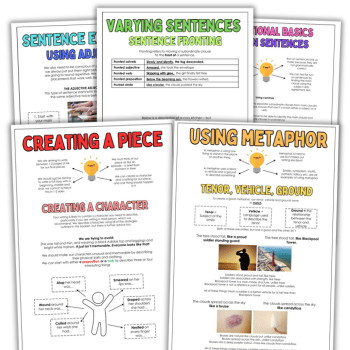33-page PDF and editable PowerPoint
KS3, KS4
Years 7-11
This GCSE English creative writing booklet will help secondary students develop their skills by focusing on the technical and stylistic aspects of fiction writing.
It addresses common struggles in writing, such as grammar, sentence variety and the use of literary devices.
By working through the sections, students can refine their ability to craft engaging, well-structured scenes, which is the focus in school writing rather than full stories.
This resource can support your students as they build confidence and creativity in their writing. It offers clear explanations, examples and practice activities that cater to a range of abilities.
GCSE English creative writing guide
This GCSE English creative writing booklet starts with a focus on grammatical accuracy. It covers areas like subject-verb agreement, tense control and avoiding run-on sentences or comma splices. These foundational skills are essential to ensure clarity and coherence in students’ work.
Later sections delve into enriching sentence construction. Students learn techniques such as sentence expansion, using adjectives effectively and experimenting with advanced patterns like triple adjectives, “no, no, no, only” structures, and varied placements for subordinate clauses.
Metaphor and simile are also highlighted, with practical guidance on how to craft these devices thoughtfully. Students are encouraged to match their comparisons carefully to create evocative imagery.
Finally, the booklet includes advice on developing characters, planning short scenes and employing literary techniques like cyclical structures and tone control to add depth and polish.
For example, students are encouraged to focus on vivid descriptions of characters and settings while keeping their scenes concise and impactful.
Assessing creative writing
Creative writing is a part of the GCSE English Language curriculum. It focuses on the creation of imaginative and engaging texts.
Students practice writing descriptions, narratives and other forms, using techniques like metaphors and varied sentence structures.
Assessment focuses on creativity, structure, vocabulary and technical accuracy, often responding to prompts or themes. It develops skills for exams and effective communication in life.
Andie Forster is head of English, a KS3/4/5 teacher and GCSE Literature examiner and team leader. Browse GCSE English Language revision resources.














